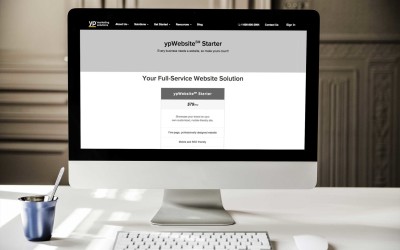I previously wrote an article about the importance of renewing and maintaining your own domain name. But, I realized, after a phone call from an upset business owner today, regarding a predicament he is in right now, that I didn’t point out the importance of making sure you have control over your domain name. Especially, if a hosting provider or website developer purchases it on your behalf. Better yet, purchase it yourself. It’s quick, cheap, easy and painless to do.
Your domain name is probably the most important piece in your online marketing puzzle. It is the “sign” that points to your location. I read an analogy that stated picture your domain name as your company sign, your hosting service as your place of business, and your website content and files as your inventory.
What is the purpose of a domain name?
Let’s say you have been in the same location for a long time, but decide to move your business to a snazzier part of town. So you rent a new location (new hosting) and your move your inventory (your website files and info) to that new location. Now it comes time to move your sign (your domain name) and it can’t be moved because the sign builder put a lock on it and didn’t give you a key. And, they won’t unlock it so you can move it. And, you can’t get another sign made with the same name.
Well, that’s a pretty big bummer right? This is what happens when you don’t have a “key” to your own domain name. The key would be that you took control of it (or were at least listed somewhere on it), in the first place.
While a website can be rebuilt, if needed, and you can always move those files to a different host, if you don’t have some “claim” to your own domain name you are in trouble if you ever have a falling out or issue with the person that does.
Your domain is an investment in your company brand. Don’t hand the keys to it over to just anyone.
How do I know if I am the owner of my domain name?
In the case of the gentleman I spoke to on the phone earlier, he wasn’t terribly internet savvy, which is understandable – I have a lot of clients that aren’t, and his domain name was purchased by his website developer at the time. The problem is, the website developer had themselves listed as the contact person in all three spots: registered agent, technical contact and administrative contact. The client’s name was nowhere to be found on a WhoIs look-up for his own domain! And, to the best of his knowledge the website designer is no longer in business. Yet, the name shows as being renewed every year and he doesn’t remember paying for renewal fees to anyone over the years. This is interesting, considering it is pointing to his site still.
The problem is, it’s pointing to a very broken version of his site. Thus, the reason for the call to me in the first place. He has no passwords, no user names and no way to access a broken WordPress site, his domain name registration area with the registrar, or a c-panel for his overall hosting. In short, he is totally locked out of his entire website that carries the same company name that he’s had for over 40 years.
Well, this is quite a pickle, huh? While I can easily build him a new site, and put him on a new host, without that domain name it is all for nothing. He is stuck with a predicament of either having to (1) take legal action against the person who won’t release it (and I’m honestly not sure how that would work out anyway), (2) rebuild his online presence with a new domain name – one that is not the name of the company, like his current one is, or (3) purchase his domain name with a .net, .co, .us, .biz or .org extension, if available (not ideal, but he may have to do if left to no other recourse).
How do I purchase my own domain name?
For those who are planning on getting website, it may be best to purchase your own domain name through a registrar like GoDaddy, eNom or Network Solutions. (By the way, while I think it is fine to buy your domain name from these companies, I don’t suggest purchasing their hosting solutions at all! Just get the name itself.)
Then you can give your web designer, web consultant, or hosting provider the user name and password to administer that account to set up your DNS servers so they point to your correct hosting solution (or they can walk you through the process and provide the correct information for that).
If you already have a domain name, run a WhoIs search and see who is listed as the “owner” for it. Make sure it’s you. If it’s not, take steps to get yourself listed on there now. Contact the person who is listed and ask them how to do that, while you are still on good terms.
Full disclosure, a lot of web developers, myself included, will offer to register and setup your domain name for you. I do it for clients all the time. It does make things a lot easier to administer on my side of things. But, I consider myself a very honest person and if one wanted to transfer it out, I would have no problem with that, as long as they were paid up and current on any money due for services.
But, you don’t know me! Just like you don’t know any other website developer you find online. For your own piece of mind, try to take care of registering it yourself, and make sure you hold onto all of your log-in information to manage it. That information will be very important on down the line too.
domain name, domain name renewals, domain names
- How a Boutique Web Design Agency Offers More Personalized Service - June 23, 2025
- When Should You Redesign Your Website? 7 Warning Signs - June 20, 2025
- We’re Honored: Named One of the Best Web Design Blogs in Florida by FeedSpot - June 10, 2025





